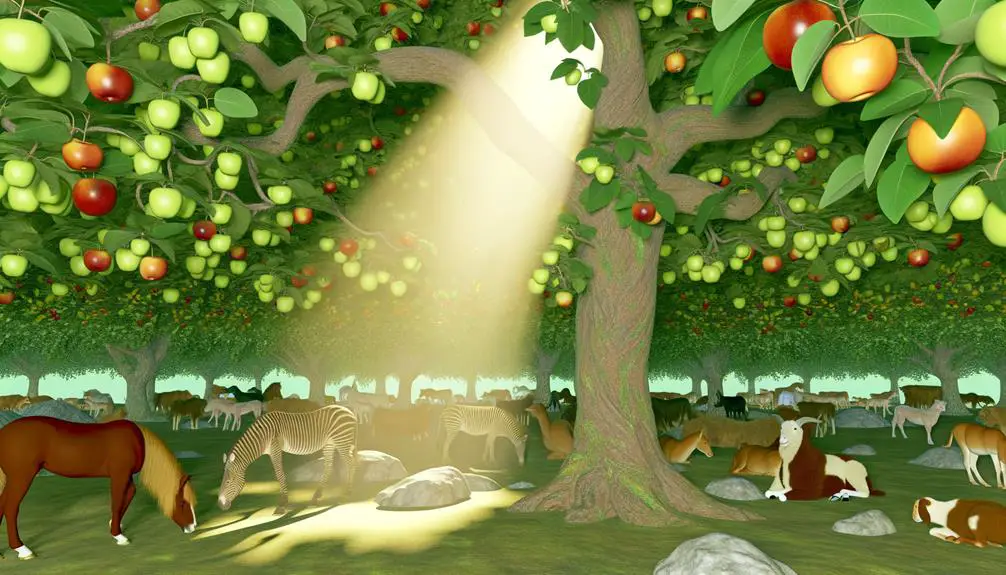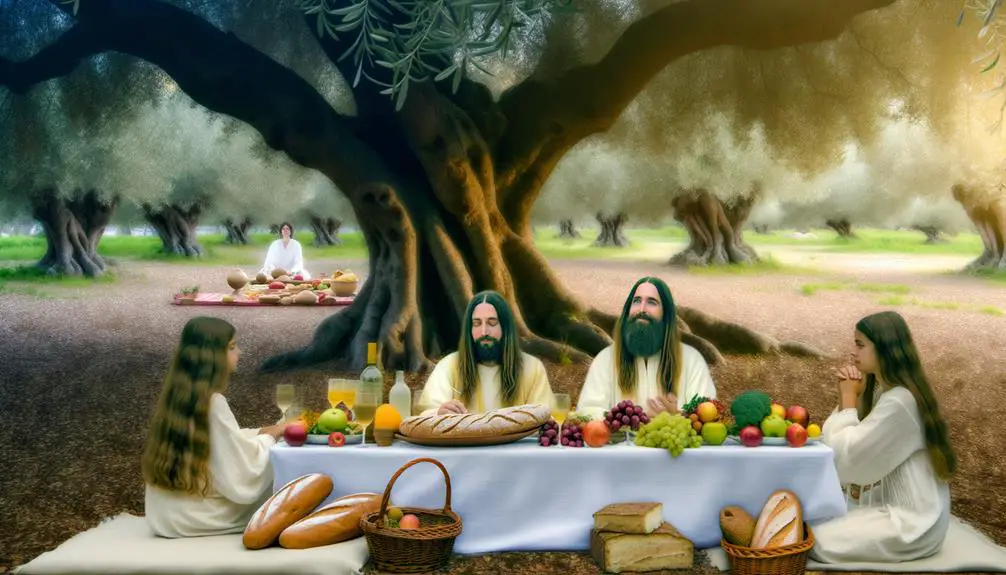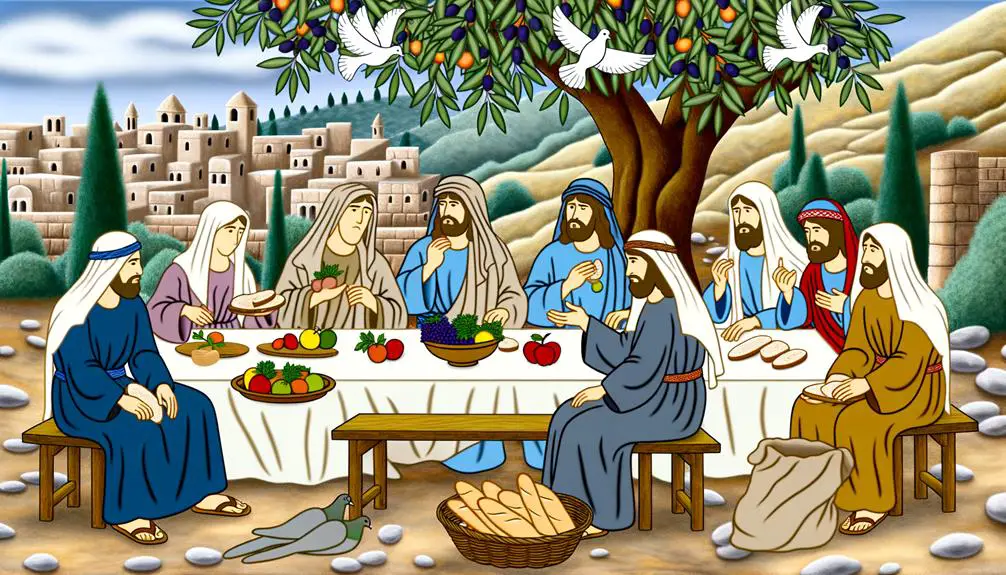Explore the intriguing connection between vegetarianism and spirituality in the Bible, and how it shapes our understanding of faith and food.

Vegetarianism in the Bible
When you look at Daniel's decision to adopt a plant-based diet, it's clear the Bible doesn't shy away from discussing vegetarianism. This ancient text offers insights into how early followers viewed their dietary choices in relation to faith.
You'll find that the Bible navigates through various perspectives, from Genesis advocating a plant-based diet to New Testament teachings that might seem to challenge these views. Exploring these scriptural passages, you'll uncover the complex relationship between dietary practices and spiritual beliefs.
Why does this matter? Understanding this connection could offer a fresh lens through which to view your own dietary choices and their spiritual implications.
Key Takeaways
- The Bible contains scriptures advocating for a plant-based diet, highlighting its ethical and health benefits.
- Daniel's vegetarian experiment showcases the Bible's acknowledgment of the health improvements from plant-based diets.
- Vegetarianism is portrayed as a spiritual discipline, reflecting a commitment to ethical eating and environmental stewardship.
- Early Christians and biblical figures often adopted vegetarian diets for ethical, theological, and health reasons.
Biblical Basis for Vegetarianism

In exploring the biblical foundation for vegetarianism, it's essential to examine the scriptures that explicitly advocate for a plant-based diet, reflecting a deep-seated belief in non-violence and stewardship of creation. This perspective isn't merely about dietary preference; it's deeply entwined with the principles of ethical consumption and a conscientious approach to life.
You'll find that the Bible doesn't shy away from discussing animal sacrifices, a practice integral to the religious and social life of ancient communities. However, a closer analysis reveals a complex relationship between these practices and the eventual evolution towards a more ethical stance on animal life. Scholars argue that such narratives can be interpreted as a journey towards recognizing the inherent value of all creation, including animals, which aligns with the principles of vegetarianism.
Moreover, the prophetic literature within the Bible often critiques the ethical implications of animal sacrifices, suggesting a movement towards internal purity and ethical living that doesn't necessarily depend on animal sacrifice. This critique paves the way for a deeper understanding of ethical consumption, where the welfare of creation, including animals, becomes paramount.
The biblical discourse on ethical consumption extends beyond the mere act of eating to encompass a holistic approach to how one interacts with the world. It challenges you to consider the implications of your dietary choices on the broader creation, advocating for a lifestyle that respects and preserves life.
Thus, when you delve into the biblical texts, you're not just looking at dietary laws or ancient practices. You're uncovering a rich tapestry of principles that advocate for a life of non-violence, stewardship, and respect for creation, which forms a compelling biblical basis for vegetarianism.
Genesis and Plant-Based Diets

Genesis's early chapters present a compelling narrative for plant-based diets, highlighting the original diet assigned to humanity. The text meticulously outlines Eden's diet, underscoring a time when humans and animals coexisted peacefully, subsisting entirely on plant-based foods. This initial dietary guideline offers profound insights into the theological and moral considerations regarding food consumption in the earliest biblical texts.
The significance of a plant-based diet in Genesis can be analyzed through three key aspects:
- Theological Implications: The diet prescribed in Eden reflects the Creator's original plan for human nourishment. It's a diet of abundance, symbolizing the harmonious relationship between humanity, animals, and the earth. This Edenic model suggests a divine preference for non-violence and respect for all Creation's provisions.
- Moral Considerations: Adopting a plant-based diet as illustrated in Genesis aligns with broader biblical teachings on stewardship and compassion. It's an expression of respect for life and an acknowledgment of humans' responsibility to care for Creation. This perspective challenges readers to consider the ethical dimensions of their dietary choices.
- Cultural Context: Understanding the cultural setting of Genesis deepens the appreciation for its dietary guidelines. In a time when agriculture was central to survival, a focus on plant-based foods not only made practical sense but also reinforced a spiritual connection to the land. This context underscores the relevance of Eden's diet for contemporary discussions on sustainability and ethical eating.
Daniel's Vegetarian Experiment

You now encounter Daniel's vegetarian experiment, a pivotal narrative that intertwines physical well-being with spiritual enlightenment. This episode not only highlights health improvements observed from a plant-based regimen but also sheds light on the deeper spiritual insights gained through dietary discipline.
Analyzing this account provides a critical lens through which to view the broader implications of vegetarianism within a biblical context.
Health Improvements Observed
Several studies have shown that Daniel's vegetarian experiment, as documented in the Bible, resulted in significant health improvements among participants. This outcome is pivotal when considering the broader implications of a plant-based diet, including addressing nutritional deficiencies and mitigating environmental impact.
Here are three key observations:
- Increased Energy Levels: Participants reported a noticeable boost in their energy, likely due to the high nutrient density of plant-based foods.
- Improved Digestive Health: The fiber-rich diet facilitated better digestion and regularity, underscoring the importance of dietary fiber.
- Enhanced Immune Function: An intake rich in fruits and vegetables contributed to stronger immune systems, showcasing the protective effects of antioxidants and phytochemicals.
These findings underscore the tangible health benefits of a vegetarian diet, while also highlighting its potential to address larger issues like nutritional deficiencies and environmental sustainability.
Spiritual Insights Gained
Beyond the physical health benefits observed, Daniel's vegetarian experiment offers profound spiritual insights, reflecting on the deeper significance of dietary choices in biblical narratives.
This account isn't merely about abstaining from meat; it's a testament to ethical eating and eco stewardship. By choosing vegetables and water over the king's rich fare, Daniel not only honored his body as a temple but also respected the creation. This decision underscores a stewardship of the earth's resources, promoting a lifestyle that's harmonious with the environment.
Furthermore, Daniel's choice illustrates a commitment to purity and simplicity, principles that transcend mere dietary laws and touch on the holistic well-being of the individual and the community. Through this lens, ethical eating becomes an act of faith and a spiritual discipline, offering insights into how one's diet can reflect broader spiritual and ethical commitments.
New Testament Perspectives

The New Testament introduces a nuanced understanding of vegetarianism, reflecting the evolving spiritual and social landscapes of early Christianity. As you delve deeper, you'll find that the texts navigate the complex interplay between dietary practices and the broader theological and ethical teachings of the time. This intersection is particularly evident when examining:
- Apostolic meals and Gentile converts: The shared meals among the apostles and early Christian communities often served as a tangible expression of unity and fellowship. However, the inclusion of Gentile converts posed significant dietary dilemmas. The apostolic guidance sought to accommodate these new members, who weren't bound by Jewish dietary laws, yet aimed to foster a sense of communal harmony. This dynamic underscores a key New Testament perspective: the prioritization of spiritual unity over strict dietary regulations.
- The Role of Food in Ethical Debates: Discussions around food in the New Testament often transcend the physical act of eating, touching upon broader ethical considerations. For instance, the choice to abstain from certain foods is framed as an act of conscience, aimed at avoiding causing others to stumble in their faith.
- Spiritual versus Physical Nourishment: The New Testament frequently juxtaposes the temporary satisfaction provided by food with the enduring sustenance offered through faith and spiritual practice. This contrast highlights an implicit valuation of spiritual over physical nourishment, suggesting a framework where dietary choices are secondary to spiritual well-being.
In analyzing these themes, it's clear that the New Testament's perspective on vegetarianism is deeply interwoven with its broader theological and ethical discourse, offering insights that transcend mere dietary guidelines.
Jesus and Dietary Practices

Building on these insights into early Christian communal practices, it's crucial to explore how Jesus' own dietary habits and teachings further shaped the discourse around vegetarianism in biblical contexts. Jesus' interactions with food, notably the Fish Miracles and Wine Consumption, offer a nuanced view that goes beyond simplistic categorizations of diet.
Aspect |
Description |
Implication for Vegetarianism |
|---|---|---|
Fish Miracles |
Jesus performed miracles involving fish, most famously the feeding of the 5,000. |
Indicates a pragmatic approach to food. |
Wine Consumption |
Jesus turned water into wine at the Cana wedding, celebrating the value of wine in fellowship. |
Suggests an inclusive view of diet. |
Teaching Parables |
Used food in parables to impart spiritual lessons, not dietary laws. |
Focuses on spiritual rather than dietary purity. |
Last Supper |
Included bread and wine, symbolizing his body and blood. |
Highlights communal sharing over dietary restrictions. |
Dietary Comments |
Declared all foods clean, focusing on purity of heart over dietary laws. |
Moves away from strict dietary codes. |
Jesus's approach to diet was inherently inclusive, emphasizing spiritual over physical sustenance. His participation in fish miracles and wine consumption reflects a broader acceptance of various foods within the context of ministry and fellowship. This perspective, focusing on the heart's purity and the communal aspect of meals, suggests that Jesus's teachings and practices could be seen as accommodating rather than prescriptive when it comes to dietary choices.
Analyzing Jesus's dietary practices reveals a complex view that intertwines spiritual teachings with everyday life, leaving room for individual interpretation and practice regarding vegetarianism in the biblical context.
Early Christian Vegetarianism

You'll find that early Christian vegetarianism isn't only rooted in the dietary choices of historical figures but also deeply intertwined with scriptural interpretations regarding diet.
This exploration reveals how these individuals interpreted biblical texts to justify a vegetarian lifestyle, reflecting broader theological and ethical considerations.
Historical Figures' Dietary Choices
Within the early Christian community, several notable figures adopted vegetarianism, reflecting a deep-seated belief in non-violence and compassion towards all living beings. This choice wasn't merely dietary but deeply entwined with the theological virtues and ethical standards of the time.
- Ancient Diets: They often comprised simple, plant-based foods, challenging the vegetarian myths that such diets were nutritionally deficient.
- Philosophical Underpinnings: The adoption of vegetarianism was linked to a philosophy of asceticism, aiming for purity and spiritual enlightenment.
- Practical Considerations: Beyond ethics, practical considerations like availability and the economics of food production influenced dietary choices.
These figures' diets underscore their commitment to living principles of kindness and empathy, setting a precedent for future generations to ponder the moral implications of their food choices.
Scriptural Interpretations on Diet
Scriptural interpretations of diet, particularly in the context of early Christian vegetarianism, offer a nuanced exploration of how religious texts influenced the dietary choices of believers.
The early Christians' perspectives on diet were profoundly shaped by scriptural references, notably those discouraging animal sacrifices and highlighting fish consumption as an exception. These texts suggest a complex view of diet, where the moral implications of eating meat were weighed against nutritional needs and symbolic practices of the time.
Analyzing these scriptural passages, you'll find that the early Christian stance on vegetarianism wasn't strictly doctrinal but deeply entwined with the sociocultural and religious context, including the significance of animal sacrifices and the pragmatic inclusion of fish in their diet. This reflection underscores the adaptability and diversity of early Christian dietary practices.
Health and Holiness

Exploring the biblical perspective, it's evident that vegetarianism intertwines with concepts of health and holiness, reflecting a deep-rooted belief in the sanctity of the body and spirit. This relationship isn't merely incidental but foundational, suggesting that the dietary practices endorsed by the scriptures serve a dual purpose: promoting physical well-being and aligning with moral imperatives.
The connection between diet, disease prevention, and ethical eating surfaces prominently in the biblical narrative. Here's how these elements interact:
- Disease Prevention: The biblical endorsement of a plant-based diet can be interpreted as a preventive measure against diseases. Vegetables, fruits, grains, and nuts—foods that are central to vegetarianism—are rich in essential nutrients, antioxidants, and fiber, contributing to a stronger immune system and a lower risk of chronic diseases.
- Ethical Eating: Ethical considerations regarding diet are deeply woven into the biblical texts. Vegetarianism is seen as a manifestation of respect for life and creation. This stance not only aligns with the principle of 'do no harm' but also promotes a holistic approach to wellness that encompasses both physical health and ethical consciousness.
- Sanctity of the Body: The body is often depicted as a temple in biblical literature, implying that its upkeep isn't solely a matter of physical health but also of spiritual duty. Choosing a vegetarian diet is thus portrayed as an act of reverence towards the divine, emphasizing the interconnectedness of bodily health and spiritual purity.
Modern Interpretations

How do contemporary scholars reconcile ancient biblical teachings on vegetarianism with today's diverse dietary practices and ethical considerations?
You're navigating a complex terrain, where cultural shifts and ethical debates converge with religious texts. Scholars meticulously examine these ancient scriptures, contextualizing them within the fabric of modern society. They identify passages that advocate for compassion towards all living beings, interpreting these as a call for a vegetarian lifestyle that aligns with today's ethical debates around animal rights and environmental sustainability.
The conversation isn't straightforward, as the Bible doesn't explicitly prescribe a universal dietary code. Instead, it offers narratives and laws that reflect the dietary habits and ethical norms of ancient societies. Modern scholars, therefore, lean into the interpretive nature of these texts. They argue that the underlying principles of compassion, stewardship of the earth, and care for one's body can guide contemporary believers towards a vegetarian diet as an expression of their faith.
In this context, cultural shifts play a significant role. Today's globalized world presents a plethora of dietary options and a deeper awareness of food's environmental and ethical implications. Scholars suggest that these changes invite a reevaluation of biblical teachings, encouraging a diet that's both spiritually meaningful and ethically responsible.
This interpretative approach sparks lively ethical debates within religious communities. Some view vegetarianism as a moral imperative, consistent with biblical teachings on compassion and stewardship. Others caution against imposing modern values on ancient texts. Amid these discussions, what emerges is a dynamic engagement with scripture, one that respects its historical context while seeking relevance in today's world.
Frequently Asked Questions
How Did Cultural Context Influence the Perception of Vegetarianism Among Biblical Communities?
Your understanding of how cultural context shaped perceptions of vegetarianism hinges on recognizing the era's agricultural practices and social hierarchy. These elements deeply influenced communal attitudes toward diets.
Agricultural methods determined food availability, directly impacting dietary choices. Meanwhile, social hierarchy influenced who could afford meat, often seen as a luxury.
This context explains why certain communities might gravitate towards or away from vegetarianism, reflecting broader socio-economic and cultural factors.
Were There Any Specific Biblical Figures Outside of Those Mentioned Who Practiced or Advocated for Vegetarianism for Reasons Not Directly Related to Health or Religious Purity?
You're diving into an ocean of ancient texts, searching for whispers of vegetarianism. While the Garden of Eden paints a paradisal picture of plant-based living, records outside the mainstream narratives are scarce.
Modern adaptations often romanticize these figures, yet scholarly analysis reveals few explicitly breaking from tradition for non-religious, non-health reasons.
It's a complex weave of history and belief, challenging to unravel but fascinating in its depth and implications.
How Does the Concept of Vegetarianism in the Bible Align or Conflict With Other Ancient Religions and Their Dietary Practices?
When you examine ancient religions, you'll find varying dietary practices closely tied to their beliefs and taboos. These diets often reflect the will or laws of their dietary gods, creating a complex relationship between food consumption and spiritual obedience.
Analyzing the concept of vegetarianism across these ancient faiths, you'll notice both alignments and conflicts, demonstrating how each tradition uniquely integrates or opposes vegetarian principles within its doctrinal and cultural framework.
Is There Evidence of Vegetarianism Being Discussed or Practiced in Lesser-Known Biblical Texts or Apocryphal Writings?
You're barking up the right tree exploring lesser-known texts for insights.
In apocryphal writings, references to vegetarianism do surface, though they're not as prominent as in canonical scriptures.
These texts occasionally hint at vegetarian prophets leading lives that eschew meat, aligning with apocryphal diets.
Such narratives offer a nuanced understanding of ancient dietary practices, enriching our grasp of how vegetarianism might've been viewed or practiced in early religious contexts.
How Have Translations and Interpretations of the Bible Over Time Affected the Understanding of Vegetarianism as It Relates to Biblical Teachings?
You're exploring how translation accuracy and interpretation variability have shaped our understanding of ancient texts. These factors drastically influence the perception of any topic, including dietary practices.
When examining historical documents, it's crucial to consider that translations mightn't always capture original meanings perfectly, and interpreters bring their biases. This complexity underlines the importance of critical analysis in discerning the true essence of teachings from ancient times.
Conclusion
In conclusion, the seeds of vegetarianism are indeed sown within the fertile grounds of the Bible, from Genesis to the New Testament. Daniel's dietary defiance and the early Christian embrace of plant-based eating illustrate a divine blueprint for health and holiness.
While Jesus's dietary practices paint a broader stroke, the biblical narrative offers a sanctuary for modern vegetarian interpretations. Like a tree known by its fruit, so too is the biblical endorsement of vegetarianism revealed through a tapestry of scripture, sprouting wisdom for contemporary contemplation.



Sign up